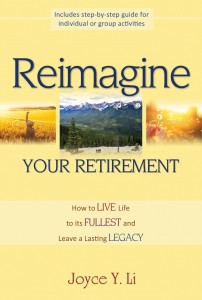If you’ve been reading this web site since its launch five weeks ago, you’ll know that Findependence, or Financial Independence, is quite a bit different than the traditional “full-stop” retirement depicted in many advertisements from the financial industry.
I like the perspective of the author of the book pictured to the right, who “reimagines” retirement to be a sort of spiritual/vocational half-way house between the decades of full-time work and career and the “eternity” that awaits us all at the end of life’s journey.
Joyce Li is a project manager and motivational speaker, originally from Hong Kong, now living with her family in Brampton, Ont.
Reimagine Your Retirement is published by Word Alive Press, and is what you might expect from a publisher focused on spiritual writing. The idea of a gradual continuum between full-tilt working to a semi-retirement consisting of some work performed on your own terms, with time for multiple alternative passions or pursuits, resembles my view of Findependence. Li gives credit to Rick Warren’s The Purpose Driven Life for inspiring her almost a decade ago: she gave six family members copies of Warren’s book, with personalized inscriptions.
Are you haunted by “nagging dreams”?
Li spends time a good chunk of time talking about ”nagging dreams “ that have yet to come true. And who among us does not harbour dreams we’ve not yet been able to manifest in this harsh workaday world and its seeming financial constraints? Li doesn’t make light of the financial side of retirement but seeks a way to reconcile it. And she’s not shy about confessing her own youthful dreams of becoming either a movie star or a pop star.
Spiced liberally with biblical quotes, Li is all about planning: plan the work, work the plan.
In the opening chapters, she reminds us the concept of retirement was non existent in biblical times and throughout most of history. And whether retirement is voluntary, involuntary, or delayed, Li doesn’t shy away from the financial side of it. One reality is that “Retirement requires financial support for an unknown time.”
And did you know the bible has at least 250 verses that discuss money? Interestingly, she says the Bible has “no direct reference to retirement or retirement planning,” except for one passage in Numbers 8:23-26. (“at the age of 50, they must retire from their regular service and work no longer.”)
While she acknowledges that some plan never to retire, some will partially do so, and some will fully retire to disengage from the workworld altogether, Li’s personal orientation seems strongly oriented to reinvention or reimagination, as the book’s title suggests. This may entail going back to school, or embarking on a brand new vocation.
The book will find few readers among atheists and agnostics, but will be thought provoking for those who see a spiritual dimension to life, no matter what particular religious affiliation.
A book for writing in
I wouldn’t suggest obtaining a library or ebook version of this book, as Li provides plenty of blanks she encourages one to fill in, with multiple exercises to put self discovery and concrete planning into practice. She’s all about discovering one’s skills, life gifts, spiritual gifts and passions, then encapsuating what you’re discovered into a personal mission statement that will chart your 20 to 30 years of a reimagined retirement. She’s a strong believer in the power of visualization, which of course is exactly what I suggest in my own book: drawing a line in the sand and declaring it your Findependence Day, even if it turns out ultimately to be a moving target.


